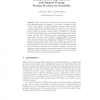106 search results - page 3 / 22 » Dependent type inference with interpolants |
ECOOP
2004
Springer
13 years 11 months ago
2004
Springer
After two decades of effort, type inference for dynamically typed languages scales to programs of a few tens of thousands of lines of code, but no further. For larger programs, th...
POPL
1997
ACM
13 years 9 months ago
1997
ACM
Languages like ML and Haskell encourage the view of values as first-class entities that can be passed as arguments or results of functions, or stored as components of data struct...
ESOP
2000
Springer
13 years 9 months ago
2000
Springer
Abstract. Type classes in Haskell allow programmers to define functions that can be used on a set of different types, with a potentially different implementation in each case. For ...
SAS
2005
Springer
13 years 11 months ago
2005
Springer
There are many source-level analyses or instrumentation tools that enforce various safety properties. In this paper we present an infrastructure that can be used to check independe...
ICAI
2004
13 years 7 months ago
2004
Current planning systems often fail to represent the reasons why certain planning decisions are made. Explicit representation of this Plan Rationale is crucial for automated plan m...

